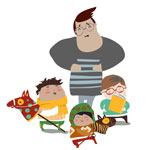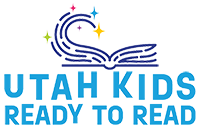Early Learning Standards: Ages 3-5

Early Learning Standards: Ages 3-5
The purpose of the Utah Early Learning Standards is to help preschool programs and parents make informed decisions regarding developmentally appropriate practice and progression across academic content areas in order to help prepare children for kindergarten. (en Español)
Strategies & Activities

Research has supported the use of evidence-based literacy practices using systematic, explicit, cumulative instruction when teaching the seven essential components of literacy: oral language, phonological awareness, phonics, fluency, vocabulary, comprehension, and writing. (en Español)

Children use creativity to explore, discover, and make sense of the world around them. As outlined in the Utah State Core Standards, the study of drama, dance, music, and visual arts provide a venue for creativity to flourish. (en Español)

The success of Utah’s young children is strongly linked to their health. The goal of Health Education is to support early childhood educators and families in developing healthy, responsible children with knowledge and skills that lead to lifelong healthy behaviors. (en Español)

Lifelong Learning Practices are key to student success and include skills to foster children’s social and academic interactions as well as support a child’s desire for learning. (en Español)

Mathematics is a way of thinking about patterns, relationships, and seeking multiple solutions to problems. Children’s knowledge of math concepts and language are used in all learning domains. (en Español)

The goal of physical education is to develop healthy, responsible children who have the knowledge, skills, and dispositions to work together, think critically, and participate in a variety of activities that lead to a lifelong healthy lifestyle. (en Español)

By cultivating this sense of wonder, adults can help children to become scientific thinkers. As they learn about the world around them, including weather, light, living things, and matter and motion, young children begin to see patterns and understand the processes that affect their personal environments. (en Español)

The primary purpose of social studies is to prepare children to become informed and engaged citizens in a culturally diverse, rapidly changing, and interdependent world. Children will learn about diverse cultures, languages, and abilities as well as the importance of including all people. (en Español)


